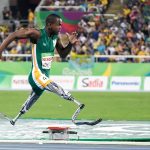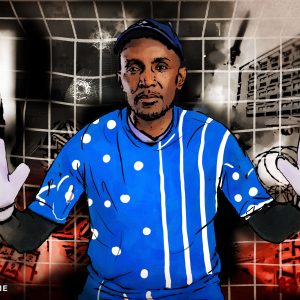Anton Raimondo’s sitting volleyball mission in SA
Raimondo fell in love with sitting volleyball when looking for a new sport to play after losing his leg in a motorbike accident. A dual citizen, he went on to represent Great Britain at the Paralym…
Author:
3 June 2020

It’s the perfect pub quiz question. In which sport have Iran and Bosnia and Herzegovina completely dominated at an international level, claiming a combined 10 of the 12 world titles contested to date?
Closer to home, it’s a sport in which Egypt and Rwanda have ruled the continent.
The answer? Sitting volleyball, a Paralympic sport played by thousands in more than 75 countries worldwide. But while the sport has been around since 1965, when it originated as a treatment for injured soldiers, it only got going in South Africa as recently as 2014. And that’s down to the efforts of Anton Raimondo, who has played the sport at the highest level possible, the Paralympic Games.
Sitting volleyball is closely linked with the more familiar standing version of the sport. But it’s played on a smaller court with a lower net and because of that, it’s way faster. Played predominantly by amputees, competitors must have some part of their body – from their bottom to their shoulder – in contact with the floor at all times when playing the ball.
“It is a highly popular, very competitive sport that’s taking place around the world. There are over 10 000 athletes actively competing, with a huge amount of competitions,” explained Raimondo. “It’s a fun game, everyone who tries it enjoys it. They are also surprised at how much exercise is involved in playing the game. It’s not just sitting, there’s a lot of movement, and lots of skill and coordination required to play the game. It’s a very tactical game.”
Raimondo lost his leg in a motorbike accident when on a family holiday in Argentina, and discovering the sport has sent him on a journey he would never have envisaged before that day.
Related article:
That’s what makes the sport such an intriguing one. Apart from the speed and skill on display, every player has a story to tell, like Fabian Muller, who was once a member of the notorious Hard Livings gang on the Cape Flats. He left the gang but then, like Raimondo, lost his leg in an accident. Having played the standing version of the game at junior national level, he was immediately drawn to the sport when he spotted a poster in the waiting room as he waited to have a new prosthetic leg fitted.
“I love the sport because it’s so inclusive. When you take off your prosthetic leg and sit on that floor, and you just glide and you feel free. It feels like you’re running again. That is one of the things that I miss the most is running and being very active. With the sitting volleyball I can do that, so I can be free, I can move, I can do all those things and I just love the sport,” said Muller, who is part of the South African national team.
“I wish that South Africans knew more about the sport because it’s very inclusive, anybody can play, whether you’re disabled, abled, young, old… and it’s just a fun sport. There are a lot of opportunities out there for lots of people and it’s just amazing,” he added.
Falling in love with the sport
Much of Raimondo’s story played out on the other side of the world, in London, where he was based when he went on that holiday to Argentina.
“After rehab in Cape Town, I eventually landed up going back to the UK at the beginning of 2009. I had been missing sport a lot. I wasn’t really sure what I was going to do for exercise besides gym work, so I started looking around in London for clubs that I could join.
“I phoned a hotline and they gave me advice on all the clubs in my area. I tried athletics, I tried wheelchair basketball and then I was told about this sport that I’d never heard of called sitting volleyball.
“The sitting volleyball club was actually just up the road from where I lived, so I went there and immediately got hooked. The guys were fun, entertaining and welcoming. I saw lots of opportunity because many of the players in that team were part of the national team already, so I could benchmark myself against them and learn what I needed to do to improve and get into the team.”
The Capetonian who also holds a British passport soon climbed the ranks, and a chance to represent Britain at the 2012 London Paralympics became a distinct possibility.
“I just loved it and I got into the national team. This was the end of 2009, early 2010 and Great Britain was now ramping up their programme for all sports in preparation for 2012. So then we started travelling to all the major tournaments and had much more intensive training programmes, and I went on the pathway through to London 2012, where I landed up being the vice-captain of the GB team.”
For Raimondo, the experience proved life-altering.
“Watching London being transformed, experiencing the feeling that people had coming to the Games – it was a very joyous time. I think London 2012 has gone down in the history books as the Games that transformed people’s views of the Paralympics, and it was the time that the Paralympics grew up as well and was seen alongside the Olympics. In fact, many people enjoyed going to the Paralympics more than they did the Olympics, which was interesting.
“I think sometimes you get lucky, and combined with hard work you get to experience something incredible like that.”
Growing the sport at home
Truly inspired by the experience, he headed back to South Africa only to discover that the sport didn’t exist in his home country. It was time to change that.
“London 2012 was uplifting for me. I saw the power of sport to transform athletes and more specifically athletes with physical impairments. I saw the power of sport to inspire people as a tool for transformation to integrate people with physical impairments with the general public. I think London 2012 really opened people’s eyes and gave a new appreciation for Paralympic sports and that was very inspiring for me. When I came back to South Africa in 2013, I felt there was an opportunity to do the same thing here and play a little role in trying to inspire transformation in sport here,” he explained.
“I think another reason I started the sport here was I saw an opportunity for South Africa to build a powerful national team. We have a lot of disability in this country. The sport didn’t exist here and with some hard work and input, I felt that a national team could compete on the international stage and it would be quite exciting to be part of that.
Related article:
“Then, thirdly, probably a selfish reason, I just really wanted to play the sport again. I loved it. I enjoyed every aspect of the game and because it didn’t exist here, I really just had to make it happen if it was going to start.”
Six years later, Raimondo, who runs his own property company, still partially funds the sport in South Africa to keep it going. There are currently several sitting volleyball clubs, mostly in the Western Cape, Limpopo and KwaZulu-Natal, as well as provincial and national structures in place, and the sport continues to grow.
It’s early days for the sport and the appearance of a South African side at the Paralympics is still some years off. But it’s certainly a goal. Qualification is tight, with only eight men’s and eight women’s teams making it to the Games.
Sitting volleyball in SA
“There’s a bit of a learning curve. Obviously, nobody knows what sitting volleyball is. The sport didn’t exist and there’s no advertising around it. There’s a little bit of convincing or explanation that’s required for people to try the sport out, but players love it when they start,” said Raimondo.
“We now have a South African men’s national team, which was formed in 2017, and that team went to the Africa Championships and represented South Africa in 2017 and last year, in 2019.
“We’re yet to start a women’s national team and we’re really keen to do that. We just need more women to come in to form a national squad, so we can select a team from there. It is realistic to get to the Paralympics one day. That is one of the long-term goals,” he added.
“It’s highly competitive though. Many of the countries that compete to get in there have had sitting volleyball programmes in their countries for 20 to 30, in some cases over 40 years. Many of them have lots of money invested in the players and some of the players or teams are professional. That’s all they do and they get a salary.
“So a lot of work would be required to get to Paralympic level. I would estimate at least an eight-year programme is required for men before we can realistically think of competing to get into the Games. On the women’s side, there’s more opportunity, especially in Africa. The continent is underdeveloped when it comes to women’s teams and we’re very keen to get a women’s team together to compete within the African continent and then hopefully qualify through Africa into the Paralympics.”
Related article:
Considering the origins of the sport and that it’s played largely by amputees, it’s hardly surprising that many of the powerhouses are former war-torn countries. Raimondo has been fascinated by the stories from some of his opposition, particularly the Rwandan team.
“Some of those players had come from different tribal groups, the Hutus and Tutsis. They had the genocide in Rwanda in the early 1990s, where whole families and neighbourhoods and communities were ripped apart as they attacked each other. This team was actually formed from members of both tribes and in some cases, people who had fought against each other,” he said.
“I mentioned before the power of sport and how it brings people together and how it crosses boundaries, how it can be a transformational tool. I think I’ve really felt that, learnt that for myself and saw that for others around me, and that’s what I’m hoping can be done here in South Africa. Sitting volleyball is an incredibly inclusive sport. Able-bodied and physically impaired can play together. It can empower people to travel, to have purpose in life, to have new goals, to meet new people… and I’d really like to help make that happen in South Africa.”
To join a club or for more information about sitting volleyball in South Africa, contact your ParaVolley South Africa provincial representative.



